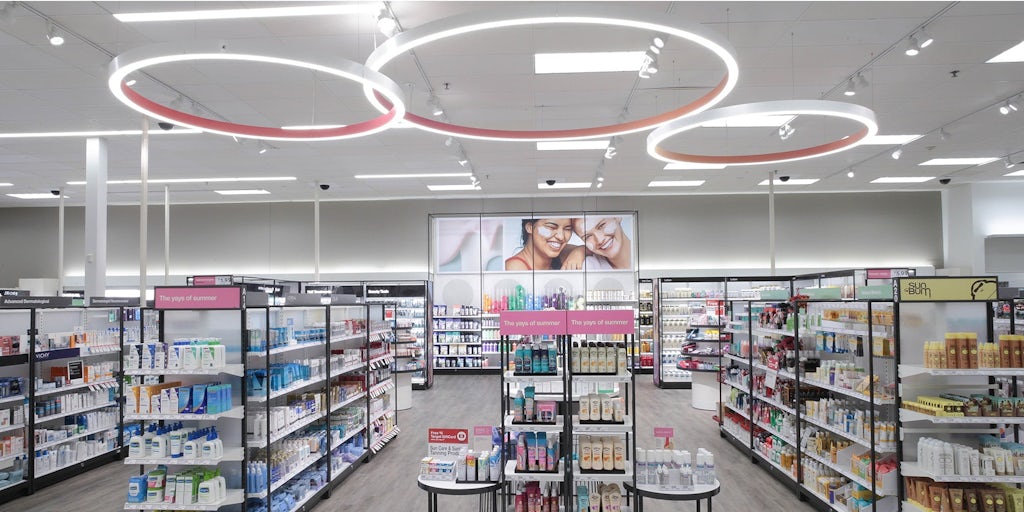Sephora and Ulta Battle for the Big-Box Retail Market | BoF Professional, News & Analysis
In the space of a few years, buying makeup and skin care at your local department store or drugstore went from the norm to a relic. The primary cause: Sephora and Ulta Beauty, which opened thousands of stores across the US, dedicated spaces that sold brands at price points that appealed not just to the Macy’s customer, but to the Sears, Saks and CVS shoppers as well.
Now thanks to the pandemic, the beauty specialty store is at risk of becoming obsolete, at least without a dramatic rethink. Non-essential retailers were forced to close this spring, and when they reopened, customers couldn’t sample products, once the cornerstone of this tactile shopping experience. Ulta and Sephora needed a new approach to selling beauty.
The answer, it turns out, was to return to beauty retail’s roots. In November, Ulta announced a partnership with Target, with plans to open 1,000-square-foot pop-ups in 100 Target stores next year. On December 1, Sephora said it had inked a deal with Kohl’s to open about 850 shop-in-shops by 2023, with 200 opening by fall 2021 (a similar partnership with J.C. Penney will wind down).
“It’s turning Target and Kohl’s into the department store feel again,” said Vic Drabicky, chief executive of January Digital, a consultancy. “It very much could end up feeling and acting an awful lot like what department stores originally operated as.”
WHAT DOES THIS MEAN FOR SEPHORA AND ULTA?
Sephora and Ulta’s partnerships with Kohl’s and Target could make thousands of their products even more accessible to the millions who still don’t live in close proximity to either specialty retailer. They’ll be broadening distribution just as large numbers of consumers may have received Covid-19 vaccines.
That means millions of people may be ready to browse the beauty aisle in stores again, rather than making a beeline for groceries and other essentials. Many will also be eager to take off their masks and reapply lipstick, or get colour-matched for foundation, for the first time in a year.
WHO GOT THE BETTER DEAL?
While both stores have strict safety and hygiene protocols and mandatory mask wearing since reopening, allegiances with mega-retailers like Target and Kohl’s offer an added layer of security in case of future lockdowns or if a vaccine takes longer to distribute than expected.
At the surface level, some think Ulta is better primed for success during uncertain times. Target’s sales have boomed during the pandemic, as the retailer was allowed to remain open even under the strictest lockdowns. Kohl’s has faced many of the same struggles as other department stores during the pandemic, and is more of a replacement for Sephora’s deal with J.C. Penney, which filed for bankruptcy earlier this year, said Drabicky.
“[Ulta] got the more premiere partner in Target, they announced it first,” Drabicky said.
But Sephora worked out a pretty good deal too: the LVMH-owned retailer gets to expand rapidly to a consumer base it hasn’t had before. It also received some perks that Ulta didn’t, including its own signage outside Kohl’s stores and a guaranteed presence near the front entrance, prime department store real estate. Its door count is also far larger than Ulta’s arrangement with Target, effectively tripling Sephora’s US store count. Sephora, largely based in struggling malls, can now take advantage of Kohl’s’ mostly off-mall, outdoor locations.
“Kohl’s ongoing transformation and best-in-class partnerships in categories that are most adjacent to beauty – fashion, wellness, active – give us great confidence in the relevance of this offering to consumers,” said Jean-André Rougeot, president and chief executive of Sephora Americas, in an email.
WHAT ARE THE BENEFITS?
All four parties stand to gain from working together, according to analysts.
The upside is threefold for the beauty retailers. It could offset some of the business lost during store closures earlier this year and become an alternative for servicing a customer segment still too weary to brave their local Ulta for an IRL beauty fix. A presence at Target and Kohl’s could be a powerful conversion tool to attract new consumers, elevating traditionally budget or masstige consumers into luxury skincare buyers.
The hope is that once they’re exposed to the luxuries of pricier skincare at Target, a newly minted prestige customer will make their way to Ulta next time they need to re-up or discover something new entirely. If you think about it, it’s likely a La Roche Posay or Versed user who regularly doles out $18 or $22 for moisturiser might trade up for a $29.50 Clinique or $34 First Aid Beauty version.
“[It’s] definitely a long-term play, this isn’t just about what’s happened with the pandemic,” said Kecia Steelman, Ulta Beauty’s chief store operations officer.
She emphasised that the shop-in-shops aren’t meant to cannibalise Ulta’s core business. It’s a way for people to get a taste of what it would be like to shop at an Ulta Store several times the size.
“I spent a lot of time in Target, and there’s a lot of consumers I don’t think have probably been in an Ulta Beauty store,” Steelman said.
For Kohl’s, the goal is to attract people who would not have visited its stores otherwise, said Erin Schmidt, a beauty industry analyst at Coresight Research. After picking up their mascara, they may buy a Champion hoodie or homewares. A recent partnership with Amazon, where customers could return e-commerce orders to Kohl’s, reportedly helped drive new customers into stores — and kept them there longer, Schmidt said.
The department store is also making a big push in the beauty and wellness categories — and an alliance with Sephora gives Kohl’s instant beauty credibility. In its last earnings call, Kohl’s said it sees beauty as a significant opportunity and plans to triple its sales in the category. In the midst of repositioning their athleisure and wellness businesses, the retailer is testing a new concept, Wellness Market, in 50 stores.
But Ulta and Sephora have to rethink exactly what products they’re going to sell and how to merchandise them in these new shop-in-shops. The splashy makeup installations at entrances of standalone stores won’t work as well at big box retailers. Schmidt expects Target and Kohl’s offerings to skew towards anything having to do with health, wellness and skin care — at least in the short term.
THIS WEEK IN BEAUTY
It will take more than a vaccine to turn around sagging makeup sales. Colour cosmetics are a cyclical business, and may need a few years to go back on the upswing.
“Blue beauty” is the latest eco-friendly buzz phrase. Products are labeling themselves “blue” to signify they avoid plastics and chemicals that harm marine life.
Chanel dinged for product claims. Chinese regulators fined the luxury label for allegedly stretching the truth in advertising for two skin care products.
Bath & Body Works spinoff on track. L Brands plans to split the body care chain from Victoria’s Secret sometime next year, and will open more stores outside malls, CEO Andrew Meslow said at a conference.
A new online store will feature beauty brands founded by people of colour. Thirteen Lune launched last week with 13 brands.
Interparfums raises 2020 revenue forecast to over €340 million. The announcement follows an uptick in business in recent months.
L Catterton invests $150 Million in Function of Beauty. The start-up, known for its customisable shampoo and hair treatment formulas, said it would use the cash to double down on product development, international expansion and manufacturing capabilities.
Beauty Bay eyes London public listing. The Manchester-based beauty e-tailer is working with investment bank GCA Altium to explore its exit options, Sky News reported.
Chanel No. 5 commemotrated on a postage stamp. The perfume will be featured as the luxury brand celebrates its fragrance’s 100-year anniversary.





